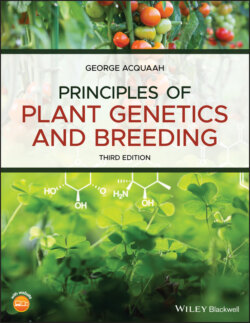Читать книгу Principles of Plant Genetics and Breeding - George Acquaah - Страница 44
WACCI maize breeding program
ОглавлениеWACCI runs a Maize Breeding Program (MBP) at a University farm on the main campus of the University with testing sites across key agro‐ecological zones of Ghana. Maize is the most important grain crop in West Africa in terms of quantity produced and consumed by its 367 million people. Failure of maize in farmers' fields due to abiotic and biotic stresses in any season can lead to hunger and starvation in West Africa. A major drought in 1982 in Ghana led to famine in the country. Resilient varieties are, therefore, key to food security. The WACCI MBP maintains about 250 inbred lines and currently uses about 20 of these lines for developing hybrids. Ten hybrid lines were developed by foundation maize breeder, Dr. Charles The, a Cameroonian of blessed memory. With initial support from AGRA between 2009 and 2012 and funding from AGRA Scaling Seeds and Technology Partnership (SSTP) in Africa from 2015 to 2017, the Centre evaluated the 10 hybrids in multi‐locational trials in farmers' fields in three major agro‐ecological zones in Ghana, namely Legon, Wenchi, and Tamale. The multilocational trials were led by Professor Pangirayi Tongoona and Dr. Beatrice Ifie, Associate Director of Breeding Programs and maize breeder respectively at WACCI. Three high‐yielding white maize hybrids (WACCI‐M‐1210, WACCI‐M‐1205, and WACCI‐M‐1218) were selected and placed before the National Varietal Release and Registration Committee (NVRRC) in Ghana for approval and release. Prior to this release, no release of a hybrid maize variety by a Higher Education Institution has occurred in Ghana. WACCI‐M‐1210 hybrid yields 8–9 t ha−1 in the Coastal Savannah, 10 t ha−1 in the Forest and Transitional zones, and 5 t ha−1 in the Guinea Savannah zone. It matures in 90–95 Days After Planting (DAP). WACCI‐M‐1205 has a yield potential of 10 t ha−1 in the Coastal Savannah, 8–9 t ha−1 in the Forest and Transitional zones, and 5 t ha−1 in the Guinea Savannah. Its maturity range is similar to WACCI‐M‐1210. Characteristic of WACCI‐M‐1218 is its early maturity, producing flowers in 45–50 DAP and maturing in 80–85 DAP. Its yield is about 6–7 t ha−1 in the Coastal Savannah and Transitional zones, and 5 t ha−1 in the Guinea Savannah zone. WACCI‐M‐1218 is a climate smart variety which can withstand drought stress. These hybrids as acknowledged by the NVRRC constitute a major feat in addressing Ghana's challenge of providing farmers with improved seed varieties. Essentially, they typify WACCI's engagement of its focus countries and communities beyond training seed scientists and plant breeders by providing farmers in the sub‐region with high‐yielding varieties. The “Planting for Food and Jobs” (PFJ) program in Ghana has engaged WACCI to produce 20 tons of commercial maize hybrid seed for planting in the 2020 major season. Efforts at increasing the seed stock produced from these high‐yielding varieties are currently ongoing through engagements with Legacy Crop Improvement Centre (LCIC) Ltd., a private foundation seed company and other commercial seed producers.
